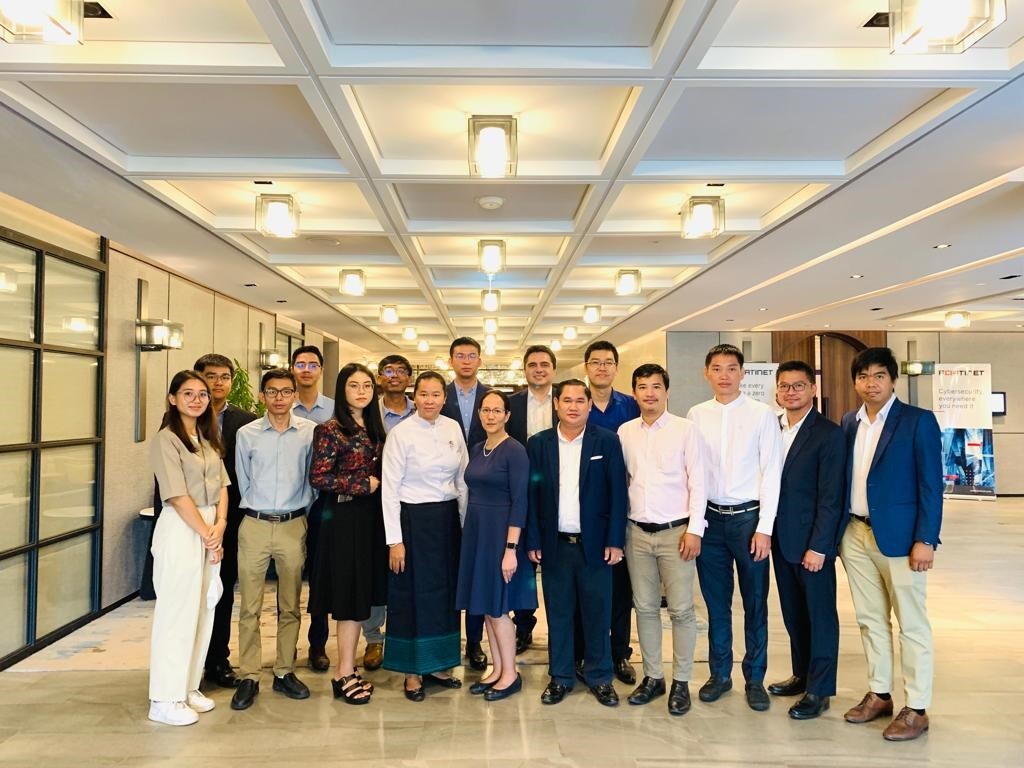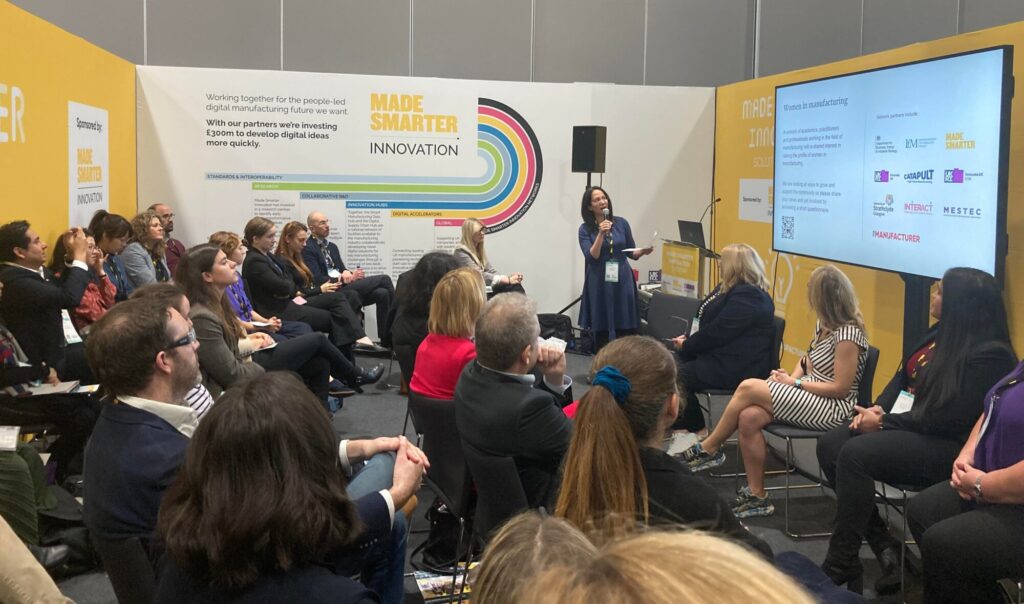Reports and articles
Manufacturing a more equitable world through informed policy-making
Published on August 15th 2023
Jennifer Castañeda Navarrete is a Senior Policy Analyst working as part of the Cambridge Industrial Innovation Policy team at IfM Engage. In her work, she informs policymakers worldwide. Her main objective is to assist stakeholders in making decisions that not only benefit the local community and industry but also consider the global perspective.
Central to Jennifer’s work is her dedication to addressing the problem of women’s underrepresentation in the industrial sector and industrial policy. This issue holds a special place in her heart, and she actively works to find good ways to tackle it.
Here, she shares how she takes on the various challenges in her field and her motivation behind pursuing her particular career path.
Can you tell us about your academic and professional background?
Both my education and my work have taken me back and forth across the Atlantic a few times. By training, I’m an economist – I did my undergraduate Economics degree in Mexico and a master’s degree in development economics at the University of Nottingham. Then, I went back to Mexico to do a second master’s in government and public policy before I came back to the UK for my PhD in Development Studies several years later.
I started my career working in regional government in the Mexican Yucatan region where I used to live. Later, I became a Lecturer at a university in the region. It was through my work there that I first became aware of IfM Engage, the knowledge-transfer arm of the IfM. When the Policy Links team first came to the region, they were interested in a study I did, so I offered to conduct a survey for them. A few years later, in 2019, I joined IfM Engage full-time.
What do you and your colleagues do?
The Policy Links team, which sits within Cambridge Industrial Innovation Policy, tries to inform policy-making by working with governments, international organisations and regional organisations around the world on industrial and innovation policy. In practice, we provide consultancy, write reports, deliver training and conduct consultations, review international practice, so we’re involved in many aspects of the processes surrounding policy-making. Approximately half of our projects are based in the UK, and half overseas. In the UK, we work with government organisations such as the Department of Trade and Industry, and internationally, with the United Nations Industrial Development Organisation and other UN organisations. Recently, we’ve been involved with a lot of projects in Southeast Asia, but we have also worked in Latin America and the Caribbean, collaborating with organisations like the Inter-American Development Bank, the Association of Southeast Asian Nations, and the Asian Development Bank.
Much of your work involves championing women in manufacturing – why is this important?
The obstacles women encounter when trying to take part in various aspects of industrial progress are often not given adequate attention, nor is the impact of these obstacles fully considered. That encouraged me to start working on gender in industry and try to understand it in a more systematic way: Why are there fewer women, what are the missed opportunities, and what can be done to change this?
It seems that the main barrier to women’s equal participation in industry and innovation is gender norms and how these affect the distribution of care and domestic tasks. Perceptions of different careers as more suitable to men or women also remain, and that leads to something we refer to as the leaky pipeline problem. That’s a metaphor for how, at each stage of career progression, fewer women remain in the science, technology, engineering and maths (STEM) fields.
Why does industrial policy need more gender-focused voices?
It’s not just about gender, it’s about diversity and the benefits it brings. Even if women, particularly in developing countries, dominate some manufacturing sectors, women’s voices are often absent in industrial policy debates. In developed countries, manufacturing is facing critical skills shortages, and involving more diverse voices in policy-making would help to better understand the opportunities and barriers that the digitalisation and decarbonisation of manufacturing offer to population groups that are underrepresented. I’m a development economist and tend to be people-centred, and I think it’s good to strive for a team that can reflect and consider the needs of the people we work to serve.
What do you want to achieve with your work?
Our general aim is to support governments and industrial organisations and inform the work that policymakers do. I think my experience working in government really helps. I’m familiar with the constraints that policymakers usually face. From the outside, it’s often easy to criticise them for not doing enough, but in government you face numerous limitations. You know you don’t have much time, and you must achieve many things simultaneously, with political pressures making it even more complex. The way I see it, our work is to help them. A lot of the time, we map different policies being deployed around the world and bring all the different options to policy-makers so that they can decide what makes sense in their particular context.
Could you share some ways that you and other women seek support to succeed in the industry and policy work?
I’ve been fortunate to always receive support from my team when I want to continue developing my skills or attend a conference. That helps, but when opportunities to meet and work with women in my sector all but disappeared during the pandemic, I felt isolated at times. Searching for networks helped me, and that was when I found the International Association for Feminist Economics (IAFFE).
Being part of IAFFE has been positive, even if I don’t always have the time to attend the meetings and events they organise. I have already built some relationships and good friendships through the Association, and we keep in touch as much as we can. Having that network is inspiring for me because it lets me see how different people are evolving their careers, and it also offers opportunities to reach out to others about collaborations. It’s important to establish valuable networks for mutual support, but it’s equally crucial to have support from your own team. I feel fortunate to have both.
Do you think professional networks for women can be part of the solution to the leaky pipeline problem with women in STEM?
Based on experience, professional networks are important because they offer young women role models. It’s conceivable that more women would remain in STEM after university if successful women in their field were more visible to them, and professional networks can play a part in that. When you’re in a field dominated by men, it’s good to talk to other people who experience the challenges that arise from that dominance, but networks aren’t just places to share things that are difficult. They can also be ideal arenas to share opportunities and cheer each other on.
For example, I’ve joined an excellent mentoring group where I had the chance to deliver a training session. My own mentors were very supportive and complimentary of my work – positive feedback always gives a nice confidence boost, and confidence is key for both students and professionals to remain motivated and enthusiastic about their field of work.

Which projects do you take pride in or consider significant to your career?
In terms of impact, I think one of the projects we’re currently working on, the implementation review of the action plan for Science, Technology and Innovation in the ASEAN nations, is really important. Interacting with all the different stakeholders across the 10 member states has been an enriching experience. They’re very knowledgeable people, very committed.
When it comes to gender, I think the policy brief I did for the United Nations Industrial Development Organization (UNIDO) will be a good contribution now that it’s published. It shows how we need to generate more data to better understand the gender gaps in different areas of manufacturing and technology.
Is there a difference in working on issues specific to women in the UK compared to other parts of the world?
The bulk of my work has taken place in the UK and Mexico, and I’ve been surprised to find a lot of commonalities between them in the work on women-specific issues. I think the main differences depend on the people and companies you work with, but I have noticed some differences that seem characteristic of each region.
In Mexico, a lot of the discussion is about the participation of women in leadership, but more basic discussions remain very challenging. For example, gender-based violence is still a key issue in Latin America, and it’s very difficult to address because the problem is systemic.
In Asia, we have seen improvements in how many girls and women are enrolled in STEM subjects, but at the same time, the number of women participating in the labour market has decreased. Even in the Scandinavian countries, which are often noted for their high levels of gender equality, areas with gender gaps remain. For example, significantly more men than women work in the technology sector there, just like in the UK, so the fight for female representation in STEM can’t be said to be won anywhere yet.

What is the Women in Manufacturing (WiM) initiative?
The Women in Manufacturing initiative was set up by some of my colleagues in IfM Engage who have worked in manufacturing for a long time and are acutely aware of the gender disparities in the field. Its aim is to boost diversity and inclusivity in the manufacturing sector through networking, events and peer support. When the initiative was being developed, I happened to learn about a funding offer from the InterAct network. That’s part of the Made Smarter programme, and because of this, we managed to join efforts and have enough funding to conduct a panel discussion and a follow-up policy brief which I’m currently working on.
Since the recent WiM events at Manufacturing and Engineering Week in Birmingham, which I was delighted to hear were successful, the initiative has gained momentum. Both the WiM networking event and the panel discussion on gender and digital technologies were very popular, and many attendees found them inspiring. That seems telling, and because the initiative is already raising awareness about women-specific obstacles in a very successful way, it has given us a big win – partly because men are showing interest and want to understand. It can be easier for women to participate in an initiative like this because we may have experienced the problems that we seek to tackle, so I’m encouraged to see that many men are making the effort.
Beyond everything that has happened already, it would be great to see more networking events come from this, and for companies to start making tangible commitments to make manufacturing an easier sector to work in for women. I look forward to see what happens next!
Where is your work taking you next?
There’s a project funded through InterAct – a network led by the Economic and Social Research Council and Made Smarter UK – about perceptions of manufacturing. It aims to provide insights into international attitudes towards manufacturing and industrial strategies, and entails a systematic review and expert validation, with a specific focus on how manufacturing is discussed in a selection of countries where digital technologies have been adopted and widely addressed at the political level. This project, along with a systematic review of ‘Manufacturing and the metaverse’ will inform InterAct’s work on the Future of Manufacturing. There are a few other things in the pipeline as well, but I can’t talk about them quite yet.
For further information please contact:
Jennifer Castañeda-Navarrete
+44(0)1223 766141jc2190@cam.ac.ukConnect on LinkedInRelated resources
News | 6th February 2026
UK Manufacturing Dashboard: latest performance and global benchmarks
3rd February 2026
The Swiss paradox: a services reputation built on an industrial and innovation powerhouse
News | 21st January 2026
CIIP delivers bespoke training for delegation from the Government of Nigeria
Read more about some of our recent projects




